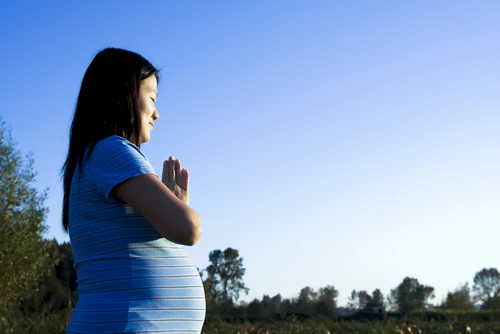Studies Show Consistent Benefits of Prenatal Yoga

Prenatal yoga programs reduce stress, resulting in improved maternal comfort, easier labor, and healthier babies and children, according to a systematic review of existing studies on yoga and pregnancy.
Quality of life and ability to cope with physical discomforts of pregnancy as well as pain during labor were some of the psychological results that persuaded researchers to call for more studies. The researchers also looked at birth weight for the babies and the number of preterm births.
The purpose of the review was to evaluate the evidence of current studies and also to make recommendations for the direction of future research.
Overall, the researchers concluded that the evidence that yoga is beneficial in pregnancy was positive enough to suggest that researchers should work with yoga practitioners to design programs that can be standardized and whose results can be analyzed in a scientific environment.
The physiological changes and psychological demands of pregnancy can lead to stress, said the researchers, and the quality of life of the mother is critical for good pregnancy outcomes. They hypothesized that maternal stress may affect the intrauterine environment through release of stress-induced chemicals, or reduced blood flow to the fetus. Changes in maternal chemical environment and blood flow due to stress could be risk factors for attention deficit, hyperactivity, and emotional and behavioral problems in infants and toddlers, as the chemicals released by the physiology in reaction to stress could affect the development of the brain and nervous system.
Therefore, the reviewers concluded that research is particularly needed for soothing techniques that reduce stress and cultivate coping strategies for dealing with stress. “Mind-body practices that cultivate general health, diminish distress, and increase self-awareness, such as tai chi or yoga, may be particularly effective in addressing both the physical and psychoemotional aspects of pregnancy and labour,” wrote the authors of the review.
After sifting through the available research, they found that yoga programs had these results:
-
During and after labor the mothers reported higher comfort rates at three different assessments.
-
At the 26th to 30th week of the pregnancy, mothers practicing yoga experienced significant reduction in stress. A self-reported perceived stress scale (PSS) was combined with object measures of heart rate, including sympathetic modulation, vagal activity, and the ratio of one to the other to measure stress. PSS scores increased significantly in the control group not practicing yoga, and decreased significantly in the yoga group.
-
Yoga may be useful as a modulator of the “fight or flight” response, because results of yoga practice were more powerful for the sympathetic nervous system.
-
Although there were no differences between the control group and the yoga practitioners in the reporting of pregnancy related discomforts during the 28th week of pregnancy, by the 40th week, the yogis reported significantly less discomfort.
-
Self-efficacy, or the positive belief in one’s ability to have a good outcome, was significantly higher for women in the yoga groups—before and during labor.
The reviewers noted that the only possible negative effect of yoga could be an increase in contractions, as is commonly found during exercise. However, they stated that since yoga can be a non-aerobic form of exercise, contractions will not generally be a problem, and if they do happen can be easily moderated.
They recommended that future research focus on yoga that is specialized, gentle, and modified to suit pregnant women, such as Iyengar or restorative yoga.
Systematic Review of Yoga for Pregnant Women: Current Status and Future Directions



